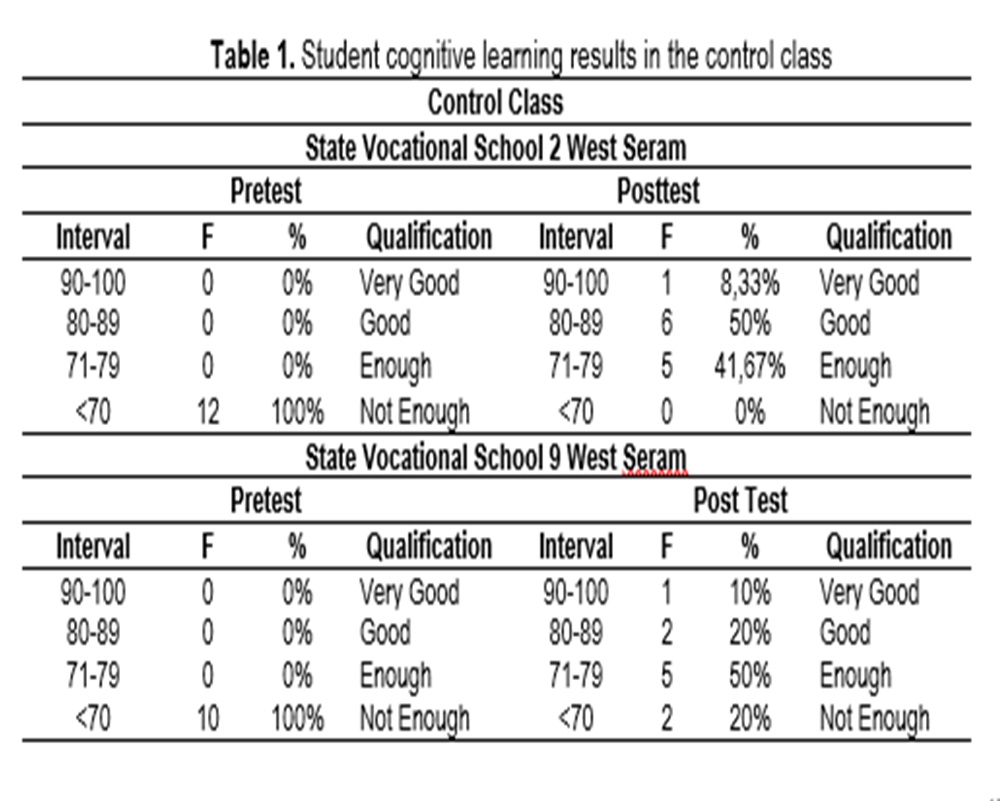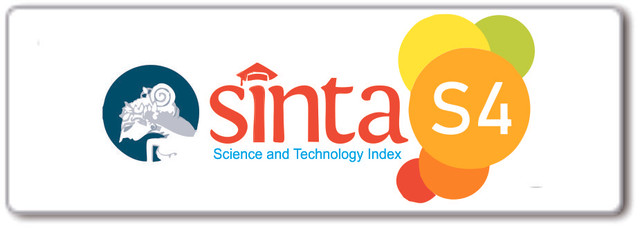The Influence of an Integrated STS Learning Approach to The Cognitive Learning Outcomes And Metacognitive Abilities of Ecosystem Materials in Class X Students of West Seram Vocational School
Abstract
West Seram Regency is one of the areas that has quite low quality educationThere needs to be innovation in using several learning approaches. Learning approacheswhich can be used to solve problems in the surrounding environment and is technology-based, namely Science Technology and Society (STS) andTechnological Pedagogical Content Knowledge (TPACK).This research aims to determine the effectlearning approachesTPACK integrated STS on cognitive learning outcomes and metacognitive abilities on ecosystem material in Class X students of West Seram Vocational School. This type of research isquasi-experiment. The research population was State Vocational School 2 West Seram, State Vocational School 9 West Seram and West Seram State Vocational School 12 with a total sample of 33 students. The research instruments used were metacognitive ability tests and questionnaires and analyzed using Ancova. The research results show thatthere is an influence of the TPACK integrated STS learning approach on cognitive learning outcomes, there is an influence of the TPACK integrated STS learning approach on metacognitive abilities, and there is an influence of the TPACK integrated STS learning approach on cognitive learning outcomes and metacognitive abilities
Downloads
References
Badriyah. 2024. Penerapan model pembelajaran Science Technology Society untuk meningkatkan kemampuan pemecahan masalah siswa pada muatan pelajaran Ilmu Pengetahuan Alam di kelas V SDN 4 Bathin Solapan Kabupaten Bengkalis. Skripsi. Universitas Islam Negeri Sultan Syarif Kasim Riau Pekanbaru.
Damayanti, P., Aini, A.N., Wulandari, N.K.F., & Primandiri, P.R. 2021. Pentingnya pengembangan kemampuan metakognitif siswa kelas XI MIPA pada pembelajaran biologi di SMAN 7 Kediri. Esjar, 156-168.
Elya, U. H., Dwiyanti, P., Emilia S., Hema, R.F., Maurin, P., & Reza, N. I. 2022. Integrasi pendekatan TPACK (Technological, Pedagogical, Content Knowledge) guru Sekolah Dasar SIKL dalam melaksanakan pembelajaran era digital. Journal of Education Integration and Development, 2(2), 15-27.
Ferdiansyah, I. 2015. Perbedaan hasil belajar peserta didik menggunakan pendekatan STS, SETS dan STEM pada pembelajaran konsep virus. Skripsi. Universitas Islam Negeri Syarif Hidayatullah Jakarta.
Imam, F. R. 2019. Technological Pedagogical Content Knowledge (TPACK): Kerangka pengetahuan guru abad 21. Jurnal Pendidikan Kewarganegaraan, 6(1), 1-10.
Muhiddin, P. 2012. Pengaruh integrasi PBL dengan pembelajaran kooperatif jigsaw dan kemampuan akademik terhadap metakognisi, berpikir kritis, pemahaman konsep, dan retensi mahasiswa pada perkuliahan Biologi Dasar di FMIPA Universitas Negeri Makassar. Disertasi Tidak Diterbitkan. Malang: Program Pascasarjana Universitas Negeri Malang.
Nofrion, Wijiyanto, B., Wilis, R., & Novio, R. (2021). Analisis Technological Pedagogical and Content Knowledge (TPACK) guru geografi di Kabupaten Solok, Sumatera Barat. Geografi, 10(2), 105–116.
Simamora, M.C., Siburian, J., & Gardjita. 2021. Analisis kemampuan metakognisi siswa dalam pembelajaran Biologi melalui assesmen pemecahan masalah di SMA Negeri 5 Kota Jambi. FKIP Universitas Jambi, 1-19.
Sufiantini, D., Rahayu, D., & Sri, R. 2017. Pengembangan perangkat pembelajaran fisika berbasis model pembelajaran Science Technology Society (STS) dalam peningkatan penguasaan materi dan pencapaian berpikir kritis pada peserta didik SMA. Jurnal Pendidikan Fisika, 6(1), 1-9.
Triwibowo, S., Abdurrahman., Nyeneng, I. D. P. 2021. Perbandingan hasil belajar kognitif siswa menggunakan media simulasi komputer dan media realia. FKIP UNILA, 77-88.
Utari, L. 2024. Identifikasi karakteristik metakognitif siswa dalam pemecahan masalah pada materi hidrokarbon Di MAN 4 Kampar. Skripsi. UIN Suska Riau.

Copyright (c) 2024 Netty Charla Kilay

This work is licensed under a Creative Commons Attribution-NonCommercial-ShareAlike 4.0 International License.
Authors who publish with BIOEDUPAT: Pattimura Journal of Biology and Learning agree to the following terms:
- Authors retain copyright and grant the journal right of first publication with the work simultaneously licensed under a Creative Commons Attribution License (CC BY-NC-SA 4.0) that allows others to share the work with an acknowledgment of the work's authorship and initial publication in this journal.
- Authors are able to enter into separate, additional contractual arrangements for the non-exclusive distribution of the journal's published version of the work (e.g., post it to an institutional repository or publish it in a book), with an acknowledgment of its initial publication in this journal.
- Authors are permitted and encouraged to post their work online (e.g., in institutional repositories or on their website) prior to and during the submission process, as it can lead to productive exchanges, as well as earlier and greater citation of published work.








 This work is licensed under a
This work is licensed under a 